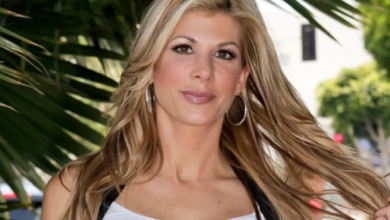“Harmonizing Change: The Emily Staveley-Taylor’ Evolution in ‘All Now'”

In an age of budget constraints, Emily Staveley-Taylor even accomplished indie-folk bands aren’t immune to “shrinkflation.”For instance, when purchasing The Staves’ fourth album, “All Now,” you might observe the group has downsized from a trio to a duo, offering one less celestial voice for your investment.
READ: Navigating Amsterdam’s Waterways: A Canal Cruise Experience
Emily Staveley-Taylor
This transformation occurred as Emily Staveley-Taylor took a hiatus to care for her two young children, leaving her younger siblings, Jessica and Camilla, to manage the family enterprise.
This development raises the question: What kind of individuals would dismiss their own sister while she’s on maternity leave?
“Only these kinds of individuals!” jests Jessica. “Shall we dive straight into the tabloid narrative? ‘The Staves spill all on their contentious separation!'”
Of course, she’s joking. In reality, the new album features a heartfelt homage to Emily—a lively, Beatles-inspired track titled “After School.”
“It’s essentially about embarking on schooling and looking up to my elder sister,” explains Jessica. “She was my support and the epitome of coolness. We followed her lead wholeheartedly.”
This admiration extended beyond the classroom. In the evenings, the sisters participated in a local theater group, where Emily consistently landed lead roles.
“She portrayed Peter Pan, she was Annie,” reminisces Jessica. “Someone once presented her with a bouquet of flowers, and from our perspective, being that young, it felt as though she were famous.”
“Hence, this song is truly a tribute to her.”
Emily’s departure posed significant challenges for a band built on intricate, three-part harmonies. Instead of opting for a “replacement” to mimic the indie Sugababes, they rearranged their compositions for two voices and enlisted their touring band to fill the void.
Having successfully experimented with this approach during live performances, The Staves felt confident in its application in the studio as well.
“It’s been an enlightening experience for us, realizing that The Staves can adapt as necessary—a fluid entity that evolves with time, yet our fans remain steadfast.”
Rejuvenated, they embarked on recording with the same commitment to musical evolution that has defined their trajectory thus far.
Their debut album, “Dead & Born & Grown” (2012), captured an acoustic intimacy—a snapshot of their adolescence performing in Watford pubs. Subsequent releases saw collaborations with Bon Iver in Wisconsin for “If I Was” and a lyrically poignant exploration in “Good Woman” (2021), tackling themes of femininity and self-doubt amidst personal loss.
The genesis of the new record arose from a similarly turbulent period—Camilla’s confrontation with mental and physical health challenges, compounded by writer’s block. Amidst a deluge of superficial empowerment messages on social media, she grappled with feelings of helplessness and inadequacy.
“The pressure to exude strength is suffocating,” she asserts. “I don’t always feel empowered, to be honest. Sometimes, life feels bleak.”
“Yet, it seems insufficient to simply be a regular person experiencing emotions, particularly for women. Society expects you to be assertive, a beacon of activism.”
Camilla’s frustration ultimately catalyzed her creativity, inspiring the album’s title track, “All Now.” Against an insistent synth backdrop, the lyrics echo the banality of empowerment memes, yet Camilla’s delivery carries a note of skepticism.
“We can challenge authority and fight back… But is it acceptable if I opt out tonight?”
It’s permissible to feel sadness or depletion, she insists, without guilt or shame.
The album delves into themes of uncertainty and alienation, addressing societal pressures to conform to a facade of strength while acknowledging the validity of vulnerability.
The production process for the album involved collaborating with Grammy Award-winning producer John Congleton, known for his work with Lana Del Rey and St. Vincent. Adopting Congleton’s directive to preserve spontaneity, The Staves embraced the creative process without finalizing songs beforehand, aiming to capture raw authenticity rather than replicate polished demos.
Faced with an unexpected opportunity to record at short notice, the band retreated to the serenity of the Peak District. Amidst the tranquil countryside, they composed fervently, allowing ideas to flow freely without inhibition. This liberated approach yielded some of the album’s most potent tracks, including the emotionally charged “Great Wave,” marked by searing guitar riffs—a departure from The Staves’ typical sound.
Reflecting on their journey, the sisters acknowledge Emily’s continued presence, particularly in songs inspired by familial ties and their late mother. While she may not have contributed to the writing process this time, her influence remains palpable.
As they navigate a new chapter with a fresh record label, Communion, The Staves confront the economic realities of independent musicianship—a landscape fraught with financial uncertainty despite their loyal fan base and sold-out tours.
“In all honesty, making a living from this profession is challenging,” admits Jessica. “The unpredictable nature of income makes financial planning incredibly daunting.”
Camilla echoes this sentiment, highlighting the meager returns from streaming platforms and the pervasive pressure to maintain an activist persona.
Ultimately, The Staves remain steadfast in their commitment to authenticity, embracing vulnerability and celebrating individuality amidst societal pressures to conform.
As they embark on a new chapter with “All Now,” The Staves stand as a testament to resilience, creativity, and the enduring power of sisterhood.




